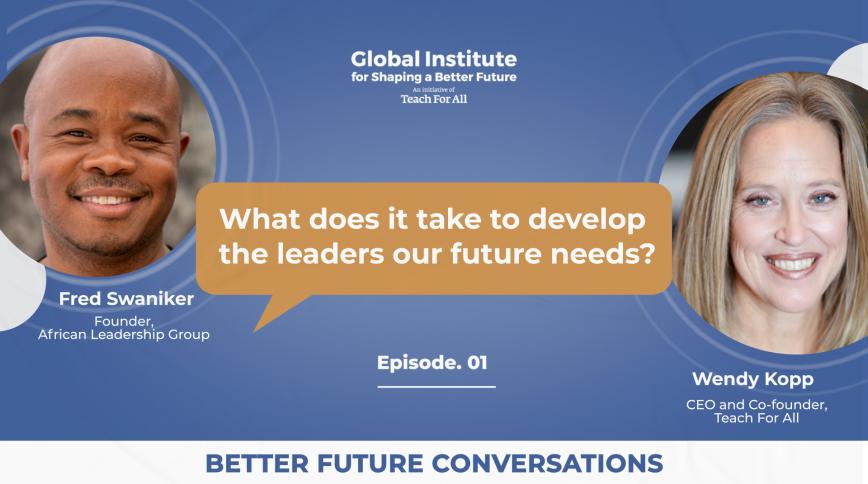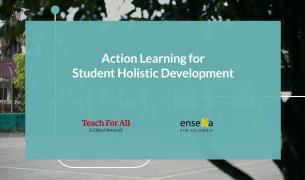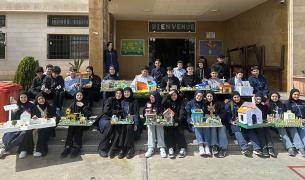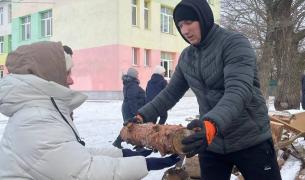Doing hard things and why it matters for the future of education

We live in a time defined by overlapping global crises: the climate emergency, widening economic inequality, and geopolitical conflict, exacerbated further by a rapidly evolving technological landscape. Today’s inequitable and outdated education systems aren’t preparing young people to meet these complex global challenges. That’s why we launched the Global Institute for Shaping a Better Future, to foster global learning among leaders all over the world who are working to reshape education to develop students who can shape a better future for themselves and all of us. Through Better Future Conversations, we’re bringing together thought leaders from all over the world whose experience and perspective can help catalyze and develop our collective thinking about what this will take.
In our first conversation, I spoke with Fred Swaniker, founder of African Leadership Academy, African Leadership University, and ALX. I’ve followed Fred’s work for years and have recently seen firsthand his transformative work at ALX, which is currently engaging 700,000 of Africa’s young adults in transformative post-secondary education to equip them to tackle the continent’s challenges. Fred shared so much wisdom and inspiration in our conversation—about how to design education systems that build agency, center purpose, and prepare young people to do hard things, in order to meaningfully shape the world around them.
I want to briefly share a few themes that stood out most to me, but I also hope you’ll take the time to watch the entire conversation. It’s rich with ideas that can help all of us think more expansively about what it will take to prepare young people to lead in this moment.
1. Choose a mission, not a major
Fred’s model challenges one of the most entrenched features of higher education: the major. Rather than asking students what subject they want to study, he asks: What problem in the world do you want to solve?
“We said if you're developing leaders, leaders are there to be problem solvers,” he remarked. “Let’s give them a menu of the world’s greatest challenges: climate change, healthcare, governance, youth unemployment, food security, and ask them: which of these do you want to solve?”
At ALX and African Leadership University, students don’t declare a major, instead they declare a mission to solve a problem in the world. And that shift changes everything from how students engage with learning, to the kind of leaders they become. This allows ALX to infuse technical training with ethics, systems thinking, and a deep awareness of context. Before students learn how to build with AI, for instance, they reflect on its purpose: “Before our students learn software engineering, data science or cloud computing, they are exposed to the world’s biggest challenges, and introduced to ethics and values. Then we begin teaching them how to use AI. By the time they build, they’re driven by purpose. They say, ‘I want to use AI to improve health,’ or ‘I want to apply AI in education or to solve climate challenges.’”
By comparison, it’s striking just how little intentionality we see being fostered in most schools and higher education institutions around core questions like: What are the biggest problems in the world? Where am I going to put my energy against them? Hearing Fred articulate this reminded us how essential it is that our education systems cultivate clarity of purpose and sense of responsibility to transform not just what students learn, but why they learn.
2. Cultivating Agency and Students as the Unlimited Resource
Throughout our conversation, Fred returned to the idea that students are education’s unlimited resource. He believes young people are naturally self-directed learners, but traditional schooling often teaches them to suppress that instinct. In most classrooms he observes, and his own personal experience across Africa, students passively copy notes from the board, rarely question authority, and internalize the idea that knowledge lives with the teacher. To reverse this, ALX designs environments where students, not teachers, are in the driver’s seat.
In his schools, students drive their own learning. Teachers then become orchestrators of experiences rather than central figures, facilitating opportunities for students to lead their own educational journeys. They step aside from the spotlight, creating spaces for debate, exploration, and independent thinking. Peer-to-peer learning and real-world projects form the core of this experience.
“We’re building a learning system around an abundant resource, which is students, rather than a scarce resource, which is great teachers,” Fred explained. “Any model built on scarce teachers is not scalable.”
What if we stopped viewing education through the lens of scarcity altogether and recenter around the abundant energy, creativity and agency students themselves bring? By centering students as the architects of their own education, we can prepare them for a lifetime of continuous growth in a rapidly changing world. This conversation made me reflect on how much more intentional we need to be about building agency into every layer of the learning experience, from pedagogy to systems to culture.
3. Doing hard things: Purpose, privilege, and wellbeing
In visiting ALX, I was particularly struck by the degree to which the students were focused on “doing hard things.” Fred shared his perspective, which shapes the culture of the African Leadership schools:
“If you're lucky enough to have health, to be alive, and to have opportunity, your job isn’t to do small things and solve small problems. The only way that you can justify your privilege is by solving the world's biggest problems, and by doing hard things.”
But he also makes it clear that this doesn’t mean struggling in isolation. It doesn’t mean promoting struggle for its own sake or glorifying burnout. Instead, it reframes hard challenges as pathways toward growth and meaning, always balanced with thoughtful attention to wellbeing. The ALX model deliberately emphasizes collaboration, mentorship, and peer networks, with teachers who are freed up to coach and support. Students learn to share burdens, navigate difficulties together, and rely on mutual encouragement rather than individual hustle. The model balances high expectations of students with deep systems of support. “Our job is to help guide and mentor and coach students so that what they're doing builds confidence and doesn’t destroy their belief in themselves.”
The result is resilience that is sustainable. Fred emphasizes guiding students through incremental, achievable challenges first, fostering self-belief and confidence before escalating to larger, more complex ambitions. Ultimately, young people thrive not despite the difficulty of their tasks but because of it, provided the environment acknowledges their humanity, supports their mental health, and equips them with resilience.
This approach fosters wellbeing not in a reactive way (reducing stress, softening challenges) but proactively (developing capacity, building networks of support, fostering purpose-driven resilience). Young people's sense of self-efficacy, developed through meaningful challenges, bolsters their psychological wellbeing, which in turn enables them to tackle more meaningful challenges confronting people and the planet.
4. The 70-20-10 Rule: Rethinking how we learn in the age of AI
Fred shares a 70-20-10 rule about how learning happens:
- Only 10% of learning occurs in formal classroom settings. Yet this dimension continues to consume most resources and attention in education globally.
- 20% of our deepest, most formative learning emerges from developmental relationships: mentors who guide, peers who challenge, and teams that collaborate. This is where learners build vital interpersonal skills, navigate conflicts, cultivate resilience, and build emotional intelligence.
- Even more significantly, 70% of learning comes from practical, hands-on experience, from actually doing the work, tackling real-world challenges, failing forward, and iterating relentlessly. It’s in this space that young people internalize skills, values, and confidence.
ALX leverages this principle. Rather than doubling down on lectures or content delivery, the program emphasizes applied learning, peer collaboration, and real-world projects. Students learn to code and to launch. They learn to absorb ideas and to test them.
And how should we think about AI?
Fred sees AI as a tool that can enhance the 10%: personalizing instruction and saving time. But he cautions that it cannot replicate the core of what makes learning transformative or what young people need to thrive in the world.
“Young people are going to be much more competitive in the world when they’ve learned how to do things, when they’ve learned how to build trust, how to navigate relationships, how to develop agency and purpose,’ he urged. “AI can’t replace those things. That’s the 70% [hands-on application] and the 20% [human relationships]. That’s what we have to focus on.”
To build future-ready education systems, especially in resource-constrained environments, the task is less about delivering better lectures and more about designing better ecosystems, places where young people learn to lead, collaborate, create, and shape a better future.
Stay Connected
This conversation is part of Better Future Conversations, an ongoing space featuring thought leaders from all over the world who can advance our collective thinking.
We’d love to stay connected. Sign up to receive updates and join us live for the next episode.



